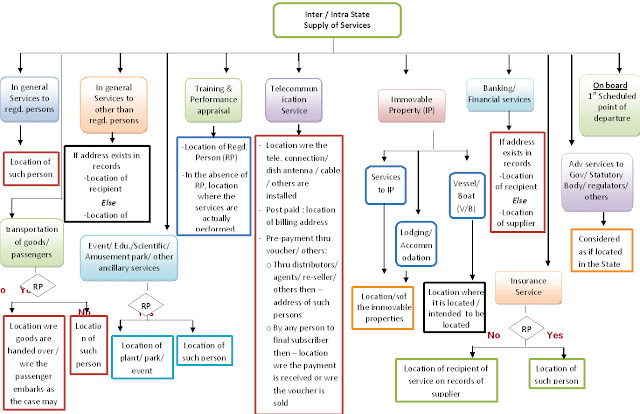Wednesday, 26 July 2017
Valuation Under GST
Introduction
The
valuation of goods/ services that are provided by the service provider to the
recipient is vital for the purpose of calculating GST. The valuation under GST
is governed by the, GST Valuation (Determination of Value of Supply of Goods and
Services) Rules, 2016.
Valuation / Methods of determining the value of goods
The methods of determining
the value of goods is broadly divided into two

Monetary Consideration
Some of the valuations methods where the
consideration is fully monetary are explained below:
Transaction Value
Method:
-
Value
determined in monetary terms
-
Taxable
value is the transaction value that is agreed by the seller and the recipient
-
While
determining the transaction value, one has to consider the following:
Taxes(excluding
GST), packing expense, insurance, interest or late fees or penalty for delayed
payment, any subsidies, trade and other discounts and other transactions that
affect the price of that particular goods / service.
-
Certain
types of discounts to be excluded like, trade discounts, quality discounts and
so on
Comparison Method:
- When
the value cannot be determined by the above method then the transaction value
of the like goods/ services supplied or provided to the other customers are
considered.
- While
determining the value under this method, the following have to be considered between
the valued goods and compared goods:
o
date
of supply
o
commercial
value and quantity levels
o
composition,
quality and design
o
freight
and insurance depending on the place of supply
Computed Value Method
-
When
the value cannot be determined by any of the above said methods then the
transaction value is determined based on the computed value method, in the
below manner:.
- While
determining the value under this method, the following is to be considered
o
cost
of production, manufacture/ processing of goods, cost of provision of service
o
design
or brand charges/ royalty incurred, if any
o
other
general expenses incurred or profit earned with regard to the goods/ services
being valued
Residual
When
the value cannot be determined by any of the above said methods then the
transaction value is determined in a reasonable manner considering the
principles and general provisions of the rules.
Query: what is reasonable
manner?
Valuation in case of Pure
Agent
When
a pure agent:
-
Enters
into a contractual agreement with the recipient of services/ goods
-
Does
not intend nor holds the title of the goods/ services
-
Does
not use the goods/ services so procured
-
Gets
reimbursed at actual incurred for procurement of the goods/ services.
Valuation:
-
The
expenditure / cost incurred by the service provider as a pure agent shall be
excluded from the value of taxable service if the following is satisfied:
o Service provider acts as a pure
agent of the recipient of service / goods while making payment to the third
party
o The recipient uses the goods/
services procured by the service provider in the capacity as a pure agent.
o The liability to make payment to the
third party lies on the recipient of service, however he authorized the service
provider to make payment on his behalf.
o To maintain separately the details
of payments made by the service provider
o The invoice to clearly indicate the
payments made by the service provider on behalf of the recipient
o The service provider to claim only
such amount paid by him to the third party on behalf of the service recipient
o Procurement of such goods/ services
as a pure agent is in addition to the services that he provides.
Valuation in case of Money
Changer
-
The value of the taxable services such as
purchase/ sale of foreign currency, money changing, provided by the money
changer is determined on the following:
o
to consider the RBI reference rate at the time of
conversion of the currency from / to INR and to multiply it with the total
units of currency
o
if the RBI reference rate is not available then
the value shall be 1% of the gross
amount of INR provided/ received by the person changing the money
o if the currencies involved in exchange is not INR
then the value shall be equal to 1% of the lesser of the two amounts the person
changing the money would have received by converting the two currencies into
INR.
Non-Monetary
Consideration
Where, the consideration for supply includes
non-monetary consideration, the following methods are to be adopted to
determine the taxable value:
a)
Open
Market Value of such supply (full value of money excluding taxes under GST
laws, payable by a person to obtain such supply at the time when supply being
valued is made)
b)
Total
money value of the supply i.e. monetary consideration plus money value of the
non-monetary consideration
c)
Value
of supply of like kind and quality
d)
Value
of supply based on cost i.e. cost of supply plus 10% mark-up
e)
Value
of supply determined by using reasonable means (Best Judgement method)
Subscribe to:
Comments (Atom)


